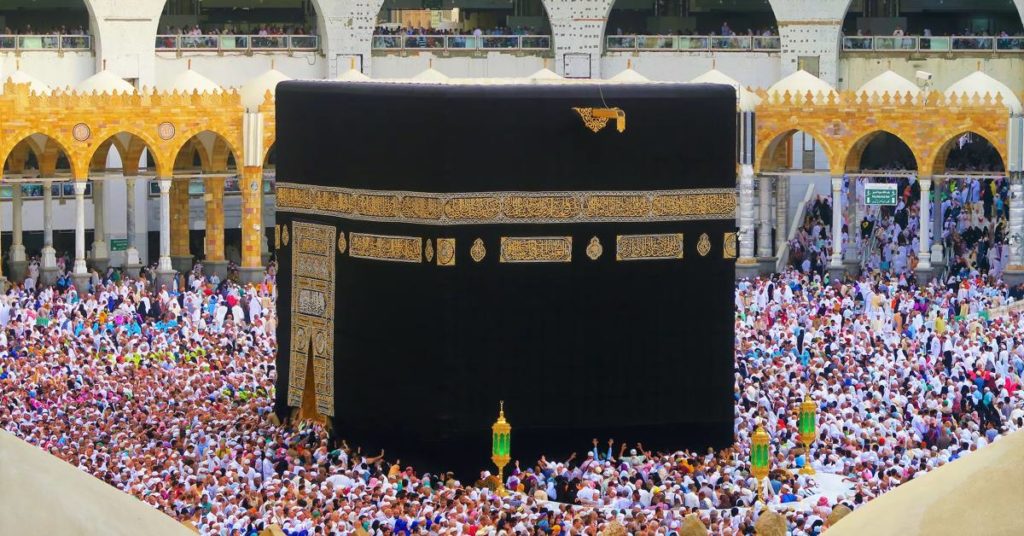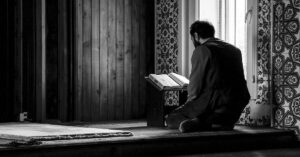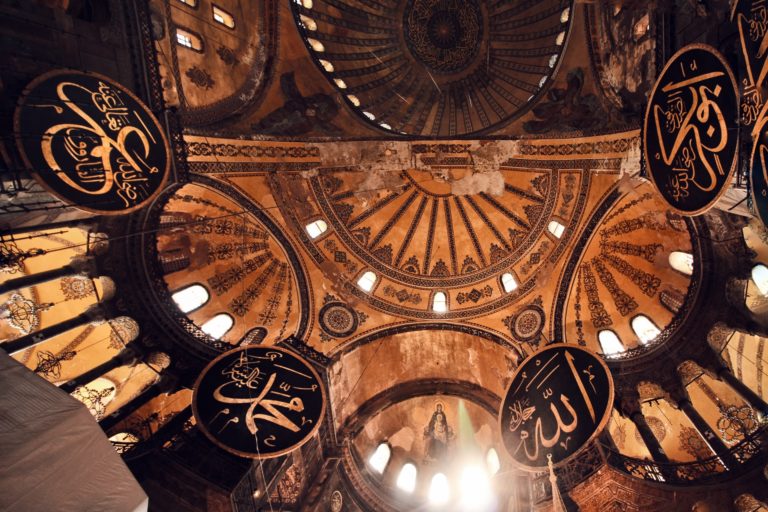Imām ʿAṭā’ ibn Abū Rabāḥ raḥimahullāh
‘I have not seen anyone who sought the pleasure of Allāh through knowledge except these three personalities: ʿAṭā’, Ṭāwūs and Mujāhid raḥimahumullāh.’
Salamah ibn Kuhayl رحمه الله
It’s the final ten days of Dhū al-Ḥijjah in the year 97AH and we’re in Makkah at Allāh’s sacred House. It’s flooded with multitudes of people who came from every deep and distant mountain highway.
They came on foot and on lean camels. Among them are elderly and young people, men and women. Some are white and some black. Some are Arabs and others are non-Arabs. Some are masters and some are servants.
Yet, they all came together submitting to the King ﷻ, answering His call and hoping and praying for His mercy, forgiveness and blessings.
And here is Sulaymān ibn ʿAbd al-Malik raḥimahullāh; one of the greatest leaders in the Umayyad Dynasty circumambulating the Ancient House. His head is uncovered, his feet are bare and he’s not wearing any clothing except an izār (lower garment, may be considered synonymous with the lungi in the Indian subcontinent) and ridā’ (upper garment, draped over the torso).
His position is the same as everyone else’s. And both of his sons are behind him.
Both of them are like the full moon in its excellence and beauty and like the perianth of a rose in its splendour and grace.
No sooner had he completed his circumambulation than he leaned to one of his dignitaries and said: ‘Where is your companion?’
He replied pointing to the western corner of Masjid al-Ḥaram: ‘He’s there performing ṣālah.’
The leader of the Muslims; Sulaymān proceeded towards that direction with both of his sons on his heels.
His dignitaries started following him, clearing the way and repelling the crowd of people away from him at which he stopped them and said: ‘This is a place where kings and commoners are all equal. No one is superior to another except through acceptance from Allāh and piety. And often, a dishevelled and dust-covered individual comes to Allāh and is accepted while kings are not.’
Then, he continued going in the direction of that man and found him still engaged in ṣalāh, immersed in rukūʿ and sujūd. There were people sitting behind him, on his left and right. So, he sat where the gathering had ended and had his sons sit with him.
The two boys started wondering who this man was, whom their father; the leader of the Muslims wanted to see such that he sat with the general public waiting for him to finish his ṣalāh.
Then, a black-skinned, Abyssinian man emerged, whose hair was crimped and was pug-nosed. When he sat, it seemed as if he was a crow.
When he completed his ṣalāh, he turned towards the direction of the khalīfah and greeted him to which Sulaymān replied.
Then, the khalīfah approached him and started asking him questions regarding each ritual of Ḥajj while the answers to each question flowed out the man’s lips.
He explained everything which such detail that there wasn’t any need to ask follow-up questions. He did this while attributing each and every statement to the Messenger of Allāh ﷺ.
When Sulaymān was finished questioning him, he thanked him and said to his sons: ‘Stand.’ They stood and the three of them left towards to the place of saʿy between Ṣafā and Marwah.
While they were on their way, the boys heard an announcement: ‘O Muslims! Only ʿAṭā’ ibn Abū Rabāḥ should give formal, legal opinions at this place. If he is not present, then ʿAbdullāh ibn Abū Najīḥ raḥimahumAllāh.’
One of the boys turned to their father and said: ‘How can an administrative official order than no one should ask for legal opinions except from ʿAṭā ibn Abū Rabāḥ and his companion? Then, we came to ask that man who didn’t take interest to the khalīfah, nor did he fulfil his right to be dignified.’
Sulaymān said to his son: ‘This man who you saw – O my beloved son – and the man to whom we showed our humility is ʿAṭā’ ibn Abū Rabāḥ; the master of legal opinions in Masjid al-Ḥaram.
He is the successor of ʿAbdullāh ibn ʿAbbās raḍiyAllāhu ʿanhum in this great position.’
He then added: ‘O my beloved son. Seek knowledge. For through knowledge, the despicable is honoured, the absent-minded is stimulated and slaves attain the ranks of kings.’
Sulaymān ibn ʿAbd al-Malik wasn’t exaggerating when he said what he said regarding knowledge. ʿAṭā’ ibn Abū Rabāḥ was a slave in his childhood, owned by a woman in Makkah.
But, Allāh ﷻ honoured this Abyssinian boy such that he placed his feet on the path of knowledge at an early age. He divided his time into three parts.
He assigned one part to his master in which he served her in the best manner and fulfilled all of his rights in the most perfect method.
He dedicated the second part to his Lord in which he worshipped Him in the purest and sincerest of ways.
The third part was committed to seeking knowledge in which he would approach those ṣaḥābah raḍiyAllāhu ʿanhum who remained alive to drink from their abundant, pure fountains.
He learnt at the feet of Abū Hurayrah, ʿAbdullāh ibn ʿUmar ʿAbdullāh ibn ʿAbbās. ʿAbdullāh ibn al-Zubayr raḍiyAllāhu ʿanhum and other companions of the Messenger ﷺ until his chest became filled with knowledge, jurisprudence and narrations from the Messenger of Allāh ﷺ.
When his master saw that he sold himself to Allāh and dedicated his life to seeking knowledge, she relinquished her rights upon him and freed him for the sake of Allāh, hoping that perhaps Allāh would make him of benefit to Islām and the Muslims.
From that day, ʿAṭā’ ibn Abū Rabāḥ assumed Masjid al-Ḥaram to be his abode. He made it his house in which he’d seek shelter, his school in which he would learn and his place of prayer in which he would gain nearness to Allāh ﷻ through piety and obedience such that historians say: ‘The Masjid was the bed of ʿAṭā ibn Abū Rabāḥ for approximately 20 years.’
The great tābiʿī; ʿAṭā’ reached a level of knowledge which surpasses every estimation. He rose to such a position which only a few attained from his era.
It has been reported from ʿAbdullāh ibn ʿUmar and his father that he came to Makkah for ʿUmrah. So, people approached him asking questions and legal opinions. He said: ‘Indeed, I am astonished at you, O people of Makkah. Are you gathering questions to ask me while you have ʿAṭā’ ibn Abū Rabāḥ in your midst?’
ʿAṭā’ attained this stature in Dīn and knowledge due to two reasons: He took charge of his soul and desires. He didn’t give them any room to take pleasure in what didn’t benefit. And he took charge of his time. He didn’t waste it in futile conversations and baseless actions.
Muḥammad bin Sūqah raḥimahullāh said to a group of his advisers: ‘Shouldn’t I inform you of something so that it may benefit you as it benefitted me?
They said: ‘Of course.’
He said: ‘ʿAṭā bin Abū Rabāḥ raḥimahullāh advised me one day and said: “O my nephew. Indeed, those before us despised futile conversations.”
I said:’ What did they consider as futile conversations?’
He said: “They used to consider everything as futile talks except the Book of Allāh ﷻ and what is needed to understand it, the ḥadīth of the Messenger of Allāh ﷺ and what it needed to comprehend it, enjoining good and forbidding evil, knowledge which is sought to gain nearness to Allāh ﷻ and conversations which are needed for one’s livelihood.”
He; ʿAṭā raḥimahullāh stared at me and said: “Do you deny ﴾Appointed over you are watchers who are noble, writers (of deeds) and who know whatever you do.﴿?[1]سورة الانفطار: من الآية ١٠ – ١١
And that everyone has two Angels ﴾Seated on the right and left. Not a single word is uttered but there is a watcher near him, ready to record.﴿?”[2]سورة ق: آية ١٧ – ١٨
Then, he raḥimahullāh said: “Wouldn’t a person feel ashamed if his book of deeds which is filled with what he did in the beginning of his day were displayed in front of him and he found most of its contents other than the matters of his religion and livelihood?”
Allāh ﷻ made ʿAṭā’ of benefit to many groups of people such as experts in the field of Islamic knowledge, workers, professionals and many others.
Imam Abū Ḥanīfah al-Nuʿmān raḥimahullāh said: ‘I erred in five issues regarding the rituals of Ḥajj in Makkah and a barber taught me them.
I wanted to shave my head to exit from iḥrām so I came to a barber and said: “How much would you charge to shave my head?”
He said: “May Allāh guide you. Acts of worship aren’t made into contracts. Sit and give me whatever is easy for you.”
I got embarrassed and sat. Except that I sat facing away from the qiblah. He signalled that I should face the qiblah so I did and my embarrassment increased. I gave him the left side of my head first to shave. He said: Turn your head to the right side so I did. He started shaving my head while I was silently looking at him in amazement. He said to me: “Why are you silent? Pronounce the greatness of your Lord.” So, I started pronouncing the greatness of my Lord until I stood to leave.
He said: “Where are you headed?” I said that I’m going to continue on my way on my camel. He said: “Pray two rakʿāt of ṣalāh, then go to wherever you’re headed.” So, I prayed two rakʿāt and said to myself: “It isn’t befitting that this occurred with a mere barber except that he possesses knowledge.”
So, I said to him: “Where did you learn what you ordered me to do?” He said: “By Allāh. I saw ʿAṭā’ ibn Abū Rabāḥ doing this. So, I adopted it from him and instructed people to do it as well.”
The world presented itself to ʿAṭā’ but he shunned it and turned his back on it. He lived his entire live wearing a shirt (qamīṣ), the price of which didn’t exceed five darāhim.
Leaders invited him to accompany them, but he didn’t answer their call, fearing that worldly affairs would affect his Dīn. And even so, he would still visit them when there was benefit for the Muslims and Islām.
ʿUthmān ibn ʿAṭā’ al-Khurāsānī raḥimahullāh said regarding this: ‘I left with my father intending to visit Hishām ibn ʿAbd al-Malik raḥimahullāh. When we reached close to Damascus, we saw an elderly man mounted on a black donkey, wearing a thick, coarse shirt, an old, worn-out jubbah, a hat clinging to his head and his stirrups were made of wood.
I laughed at him and asked my father: “Who is this?”
He replied: “Be quiet. This is the leader of jurists in Ḥijāz; ʿAṭā ibn Abū Rabāḥ.”
When he reached close to us, my father descended from his mule and ʿAṭā’ descended from his donkey. They embraced and started asking each other questions. Then, they mounted their animal and proceeded until they stooped at the door of Hishām ibn ʿAbd al-Malik’s castle.
No sooner had they sat comfortably than they were permitted to enter. When my father exited, I said to him: “Tell me about what occurred between you to.”
He said: “When Hishām knew that ʿAṭā ibn Abū Rabāḥ was at the door, he rushed to permit his entrance. By Allāh, I was only allowed to enter because of him. When Hishām saw him, he said: “Welcome, welcome. Come here, come here.” He continued saying: “Come here, come here.” Until ʿAṭā’ was seated with him on his couch with his knee touching his.
The gathering included the most noble of people who were speaking among themselves but then they became silent.
Hishām approached him saying: “What do you need, O Abū Muḥammad?”
He said: “O leader of the Muslims. The people of al-Ḥaramayn (Makkah and Madīnah) are the people of Allāh and neighbours of His Messenger. Distribute their needs to them.”
He said: “Certainly. O young boy, record that the people of Makkah and Madīnah would receive their provisions for a year.”
Then he said: “Do you need anything else?”
He replied: “Yes, O leader of the Muslims. The people of Ḥijāz and Najd are the roots of the Arab and leaders of Islām. Return the surplus of their charity.”
He said: “Certainly. O young boy. Record that the surplus of their charity will return to them.”
He asked again: “Do you need anything else?”
He said: “Yes, O leader of the Muslims. The front lines of those protecting the borders are in the face of the enemy. They kill whoever intends evil for the Muslims. Send abundant provisions to them for if they are destroyed, the borders would be breached.”
He said: “Certainly. O young boy. Record that provisions would be sent to them.”
He asked yet again: “Do you need anything else, O Abū Muḥammad?”
He said: “Yes, O leader of the Muslims. The non-Muslims under your protection should not be charged with more than they can bear. Indeed, the tax you receive from them is a means to help you against your enemy.”
He said: “Certainly. O young boy. Record that the non-Muslims under our protection should not be charged with more than they can bear.”
He asked again: “Do you need anything else, O Abū Muḥammad?”
He said: “Yes. Fear Allāh, O leader of the Muslims. And understand that you were created alone, you will die alone, you will be resurrected alone and you will be taken to account alone. By Allāh, those whom you see now will not be with you.”
Hishām raḥimahullāh toppled to the ground in distress and began to weep. Then, ʿAṭā’ raḥimahullāh stood and I stood with him. When we reached the door, a man came with a bag, the contents of which I do not know and said: “Indeed, the leader of the Muslims has sent this to you.”
He said: “Far too improbable to be accepted. ﴾I do not claim any reward from you for it. My reward is with none but with the Lord of the worlds.﴿[3]سورة الشعراء: ١٠٩
By Allāh, he entered upon the khalīfah and left his presence and had not drunk even a drop of water.”’
ʿAṭā’ ibn Abū Rabāḥ raḥimahullāh lived a long life so much so that he attained the age of 100 during which he filled it with knowledge and action. He filled his life with obedience and piety and purified it with abstinence from the world and what people owned and he yearned for that which is with Allāh.
When death came to him, he found himself free from the burdens of the world and filled with provisions for the Hereafter.
And in addition to that, he performed Ḥajj 70 times during which he stood on the plains of ʿArafah 70 times asking Allāh for His pleasure and Paradise and seeking His protection from His anger and the Fire.
[Translated from Ṣuwar min Ḥayāh al-Tābiʿīn]




